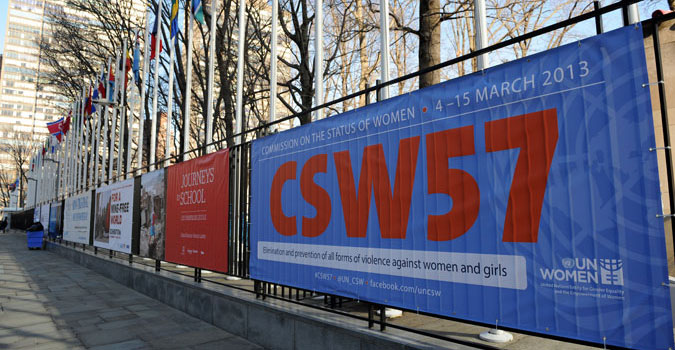Commission on the Status of Women

The Commission on the Status of Women (CSW) is the principal global intergovernmental body exclusively dedicated to the promotion of gender equality and the empowerment of women. A functional commission of the Economic and Social Council (ECOSOC), it was established by Council resolution 11(II) of 21 June 1946.
The CSW is instrumental in promoting women’s rights, documenting the reality of women’s lives throughout the world, and shaping global standards on gender equality and the empowerment of women.
In 1996, ECOSOC in resolution 1996/6 expanded the Commission’s mandate and decided that it should take a leading role in monitoring and reviewing progress and problems in the implementation of the Beijing Declaration and Platform for Action, and in mainstreaming a gender perspective in UN activities.
During the Commission’s annual two-week session, representatives of UN Member States, civil society organizations and UN entities gather at UN headquarters in New York. They discuss progress and gaps in the implementation of the 1995 Beijing Declaration and Platform for Action, the key global policy document on gender equality, and the 23rd special session of the General Assembly held in 2000 (Beijing+5), as well as emerging issues that affect gender equality and the empowerment of women. Member States agree on further actions to accelerate progress and promote women’s enjoyment of their rights in political, economic and social fields. The outcomes and recommendations of each session are forwarded to ECOSOC for follow-up.
UN Women supports all aspects of the Commission’s work. We also facilitate the participation of civil society representatives.
Methods of Work
The Commission adopts multi-year work programmes to appraise progress and make further recommendations to accelerate the implementation of the Platform for Action. These recommendations take the form of negotiated agreed conclusions on a priority theme.
Under its current methods of work, established by ECOSOC resolutions 2006/9 and 2009/15, at each session the Commission:
- Engages in general discussion on the status of gender equality, identifying goals attained, achievements, gaps and challenges in relation to implementation of key commitments;
- Focuses on one priority theme, based on the Beijing Declaration and Platform for Action and the outcome of the 23rd special session of the General Assembly;
- Holds a high-level roundtable to exchange experiences, lessons learned and good practices on the priority theme;
- Evaluates progress in implementing agreed conclusions from previous sessions as a review theme;
- Convenes interactive panel discussions on steps and initiatives to accelerate implementation, and measures to build capacities for mainstreaming gender equality across policies and programmes;
- Addresses emerging issues that affect gender equality;
- Considers in closed meeting the report of its Working Group on Communications;
- Agrees on further actions for the promotion of gender equality and the empowerment of women by adopting agreed conclusions and resolutions;
- Contributes gender perspectives to the work of other intergovernmental bodies and processes; and
- Celebrates International Women’s Day on 8 March, when it falls within its session.
The Commission elaborated a multi-year programme of work for the first time in 1987, containing priority themes for discussion and action at its annual sessions, per ECOSOC resolution 1987/24. Subsequently, multi-year programmes of work were adopted in 1996 in ECOSOC resolution 1996/6, in 2001 in ECOSOC resolution 2001/4, in 2006 in ECOSOC resolution 2006/9, and in 2009 in ECOSOC resolution 2009/15. A new work programme is to be adopted by ECOSOC in 2013. Since 2006, the Commission has added an annual review theme, to evaluate the implementation of agreed conclusions from a previous session.
Based on the most recent resolution from 2009, priority and review themes for 2010–2014 are:
- 2010: Review of the implementation of the Beijing Declaration and Platform for Action, the outcomes of the twenty-third special session of the General Assembly and its contribution to shaping a gender perspective towards the full realization of the Millennium Development Goals.
- 2011: Priority theme: Access and participation of women and girls to education, training, science and technology, including for the promotion of women’s equal access to full employment and decent work. Review theme: The elimination of all forms of discrimination and violence against the girl child, from the 51st session of the CSW.
- 2012: Priority theme: The empowerment of rural women and their role in poverty and hunger eradication, development and current challenges. Review theme: Financing for gender equality and the empowerment of women, from the 52nd session of the CSW.
- 2013: Priority theme: Elimination and prevention of all forms of violence against women and girls. Review theme: The equal sharing of responsibilities between women and men, including caregiving in the context of HIV/AIDS, from the 53rd session of the CSW.
- 2014: Priority theme: Challenges and achievements in the implementation of the Millennium Development Goals for women and girls. Review theme: Access and participation of women and girls to education, training, science and technology, including for the promotion of women’s equal access to full employment and decent work, from the 54th session of the CSW.